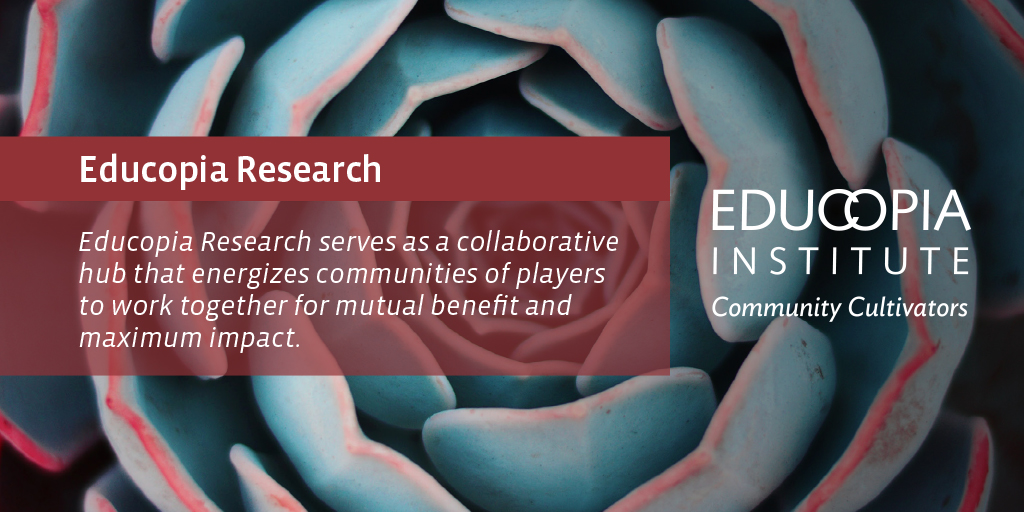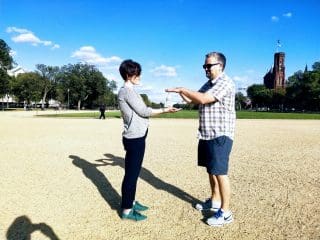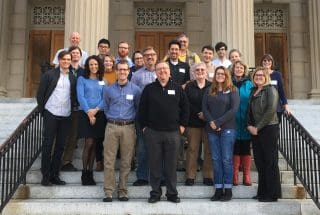April 27, 2020
Educopia Research Energizes Communities to Work Together for Mutual Benefit and Maximum Impact
By Katherine Skinner and Hannah BallardEducopia Research serves as a collaborative hub that energizes communities of players to work together for mutual benefit and maximum impact. Our research activities are designed to support our strong belief that system-wide change can only accomplished with system-wide leadership. We build networks of players across numerous boundaries, helping them to align their work to accomplish commons goals together and at scale.

If you’re curious to learn more about Educopia’s work with community organizations, see our 2019 Annual Report for additional case studies from the Software Preservation Network, BitCurator Consortium, MetaArchive Cooperative, and Library Publishing Coalition.
The Coalition for Diversity and Inclusion in Scholarly Communications (C4DISC) approached Educopia in the spring of 2019 to facilitate its community Formation process. The Educopia Research team designed and facilitated a series of ten virtual convenings held over a six-month intensive work period, providing a structured process for C4DISC’s growth from an informal group of publishing associations into an organized community.
In working sessions, Educopia helped the group maintain its focus on the decisions and documentation most crucial in constructing a stable operational form. We began with the formalization of a “founders” group, a set of individuals who were empowered to explore options and make initial decisions about the form and function of the prospective community. We then guided the founders through a series of exercises that solidified C4DISC’s mission, vision, and goals. Finally, we provided scaffolding to help this group determine the organizational, governance, and business elements that would best support and sustain its efforts over time. The founding representatives successfully completed this work in Fall 2019, and are launching the new community in 2020.
The Maintainers is a global research network interested in the concepts of maintenance, infrastructure, repair, and the myriad forms of labor and expertise that sustain our human-built world. Its founders approached Educopia for help in realizing their vision: an organization that would serve as a core resource and umbrella that supports multiple, topically focused maintainers communities, each of which assists a specific field of work, such as transportation, recycling, information, and workforce development.

Jessica Meyerson (left) and Andy Russell (right), Co-Directors of The Maintainers, in Washington, D.C.
With generous funding from the Alfred P. Sloan Foundation, Educopia supported the work of The Maintainers to establish this hub-and-spoke model. Together, we built a common core (Maintainers Central) that provides administrative, technical, and organizing support to numerous domain-specific “maintenance communities.” We also co-authored with this community-of-communities Maintenance Community Framework (forthcoming 2020), which will serve as a blueprint for organizing individual maintenance communities as part of the Maintainers network.

Open Source Software Archival Workflows (OSSArcFlow)—when the BitCurator Consortium surfaced a common concern regarding the invisibility of digital curation workflows, Educopia Research responded by helping the community to design and implement the internationally renowned OSSArcFlow project.
With generous support from the Institute of Museum and Library Services, the OSSArcFlow project team developed a method and framework for representing digital archiving workflows in order to better understand gaps, ineffiencies, similarities, and differences in the ways collecting institutions deploy open source software tools.
By mapping the workflows of twelve libraries, archives, and museums, the team has surfaced a range of technical and institutional drivers that lead institutions to choose different workflow approaches, even when they are all using the same group of open source tools. The team is now building guidance documentation and training modules to help other institutions to map their workflows using a common framework. This in turn will enable other collecting institutions to better understand and address their shared needs, pain points, and challenges.
To learn more about Educopia’s approach to growing and sustaining collaborative communities, see Community Cultivation—A Field Guide for a wealth of activities, tools, and hard-won lessons for community organizer and leaders.